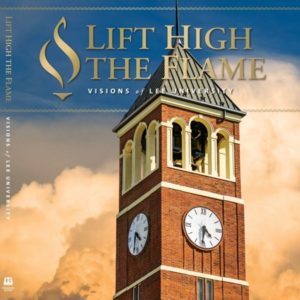Lee University has emerged in recent years as an institution of national standing in many areas that are frequently ranked by outside observers. One of the reasons for this emergence is that Lee stands out in a select group of higher education institutions, that of Christ-centered, liberal arts colleges and universities. Another reason is that Lee’s original core values and goals have remained strong even as it has adapted to the changing landscape of academic and professional life.
Lee University’s recent success belies its humble beginnings almost a century ago. In response to its need for trained Christian workers, the Church of God considered the establishing of a Bible training school at its sixth annual General Assembly in 1911. The Assembly appointed a committee to locate a site and erect a building and established a board of education consisting of seven men. However, six years passed before these early plans bore fruit. The denomination’s General Assembly of 1917 passed measures to institute a school, with classes to meet in the Council Chamber of the Church of God Publishing House in Cleveland, Tennessee. The Reverend A. J. Tomlinson, Superintendent of Education, opened the first term on January 1, 1918. There were twelve students with Mrs. Nora B. Chambers as the only teacher.
By the beginning of the fifth term one room was no longer sufficient to house the school. A vacant church building on 24th and People streets was converted into classrooms and a dormitory in 1920. Again, the school outgrew its facilities. In 1925 it was moved to the Church of God Auditorium on 24th Street and Montgomery Avenue.
A high school division was added in 1930 and continued to be a part of the school’s program until 1965. In 1938 the Murphy Collegiate Institute was purchased, and the Bible Training School moved from Cleveland to Sevierville, Tennessee. A junior-college division was added in 1941. This division was accredited by the Commission on Colleges of the Southern Association of Colleges and Schools in 1960. The school returned to Cleveland in 1947 after purchasing the Bob Jones College campus, a site which as early as 1885 had housed Centenary College and Music School, a Methodist institution. Upon returning to Cleveland, Bible Training School received its new name, Lee College, in honor of its second president, the Reverend F. J. Lee.
The liberal arts initiative at Lee College came into its own in the mid-1980s with a deliberate move to embrace the broader evangelical Christian community. The shift brought an influx of new students and faculty. In the thirty-four years between 1986 and 2020, student enrollment more than quadrupled from just over 1200 to more than 5100.
While Lee remains committed to its denominational affiliation, the institution’s inclusive enrollment policy now attracts students with a variety of religious traditions, academic abilities, and ethnic and socio-economic backgrounds. Lee draws students from nearly all 50 states and more than 50 countries.
The faculty has also grown and diversified to keep pace with the 57 undergraduate majors, 159 undergraduate programs, and 56 graduate programs in its six schools: School of Business, College of Arts & Sciences, the Helen DeVos College of Education, the School of Music, the School of Religion, and the School of Nursing. Faculty members come from around the world and represent a wide range of academic, cultural, and religious backgrounds.
Campus construction programs have added significant acreage and more than 23 major buildings to Lee’s landscape over the past twenty years. Among these are eight new dormitories, six classroom buildings, a student union building, a chapel, two recreation centers and two athletic facilities, a health clinic, a recital hall, and recording studio.
At the turn of the new millennium, Lee University became a higher education pioneer in incorporating benevolence and service learning, personal strengths development, and cross-cultural studies as a regular part of every student’s educational experience. Lee was ranked by The Institute of International Education Open Doors (IIEOD) in the Top 5 of 40 institutions with the highest percentages of participation in Study Abroad programs in 2017-2018. The IIEOD also ranked Lee for the same year as one of the Top 15 out of 40 institutions for total number of study abroad students. In previous years, Lee has also been recognized for its leadership in various areas, appearing on the Templeton Foundation’s Honor Roll of Character Building Colleges; appearing multiple years on the Corporation for National and Community Service’s Honor Roll for the service efforts of our students, once receiving its President’s Award, a distinction it shared with five other American universities; and named one of the Great Colleges to Work For, sponsored by the Chronicle of Higher Education.
For the university’s centennial celebration in 2018, Lee produced Hundred Year Journey, a full length historical documentary about Lee’s progress through the first 100 years of its existence. View Hundred Year Journey below:

Historical material about Lee was also published in the same year for a centennial commemorative coffee table book, Lift High the Flame. Copies of this book are still available for purchase at store.leeuniversity.edu, where you can also obtain DVD/CD copies of Hundred Year Journey.
